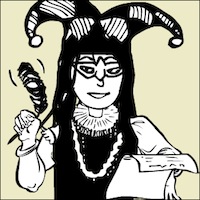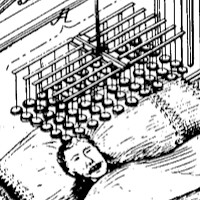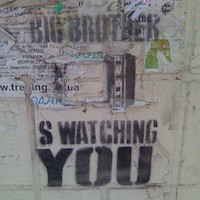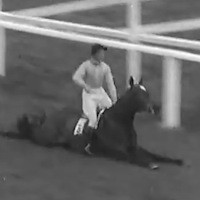The Scopes Monkey Trial

It was today in history, July 10, 1925, that one of the most famous and controversial trials in history happened. John Scopes, a substitute science teacher, was arrested for teaching evolution to his students in Dayton, Tennessee. A trial that looked more like a circus sideshow ensued.
In January of 1925, Rep. John Butler introduced a bill in the Tennessee House of Representatives calling for a ban on the teaching of evolution. The law, if passed, would prohibit the teaching of "any theory that denies the story of the Divine Creation of man as taught in the Bible, and to teach instead that man has descended from a lower order of animals." The law, now known as the Butler Act, was passed and signed by the governor of Tennessee in March of ’25. Tennessee became the first state to pass a law against teaching evolution in schools.
In May, a newspaper in Chattanooga ran a notice submitted by the American Civil Liberties Union, or ACLU, for any teacher in Tennessee who would like to challenge the law. The ACLU said that if they had a willing participant to test it, they could do so without the teacher losing his or her job. Town leaders in Dayton, Tennessee met informally and wanted to have the test done in their town in hopes that it would “put Dayton on the map” and bring a much needed boost to their economy. They invited a teacher by the name of John Scopes to a meeting and when they found out that he was teaching evolution from a school textbook, they asked him if he would be the test candidate. Scopes wasn’t even the regular biology teacher there. He was just filling in for the regular teacher who was out of school due to an illness. Scopes said that he would do it.
The three-time Democratic presidential candidate and well known orator, William Jennings Bryan offered his services on behalf of the prosecution and days later, Clarence Darrow said he would represent the defense. On May 25, a grand jury did indict John Scopes for violating the new law and the stage was set. Over the next couple of months, the town of Dayton began preparations for the onslaught of people that were sure to come for the trial. Camps were built to house tourists, platforms and podiums were constructed on the courthouse lawn, and the courthouse itself was supplied with lines for the telephone and telegraphs and platforms for cameras and radio microphones were built as well. One site I researched for this article stated that even WGN Radio showed up to broadcast live and would be the first broadcast of its kind anywhere.
After the first day of the trial, there were about a thousand people in the courthouse and fearing for the safety of the people and the building, the presiding jurist, Judge Raulston, said that the trial will be moved to the courthouse lawn under a tent that would seat about twenty thousand people. The town was indeed a side show, there were monkeys there, a man from Vermont who was a side show as “the missing link”, food vendors, lemonade stands, etc…
When it was all said and done, the trial lasted a week and Clarence Darrow, on behalf of the defense, asked the jury to bring back a guilty verdict. A guilty verdict would allow the case to be appealed to the state supreme court. The jury took only minutes to return a guilty verdict and Judge Raulston fined Scopes one hundred dollars; a fine that ACLU offered to pay for John Scopes. In an appeal, the Tennessee Supreme Court ruled that the Butler Act was constitutional and even overturned the original guilty verdict stating that the jury should have set the fine and not the judge.
I must point out that no one was angry with John Scopes and there was no torch carrying lynch mob out for his blood and he never spent one minute in jail as the movie, Inherit the Wind would have you think. He was arrested by his friend, City Attorney Sue Hicks and that before and after the trial, John Scopes was loved by the people of Dayton as he was the coach of the high school’s winning football team. In fact, the movie, Inherit the Wind, which was very loosely based on the trial, opened in Dayton in a drive-in theater in Dayton, Tennessee in 1960 and John Scopes returned to Dayton for the premiere and was given the key to the city. William Jennings Bryan died in his sleep, in Dayton, five days after the trial ended.
There was a lot of information that I could not put in this article, so please follow the links I have provided below if there is anything more you want to know about the trial.
In January of 1925, Rep. John Butler introduced a bill in the Tennessee House of Representatives calling for a ban on the teaching of evolution. The law, if passed, would prohibit the teaching of "any theory that denies the story of the Divine Creation of man as taught in the Bible, and to teach instead that man has descended from a lower order of animals." The law, now known as the Butler Act, was passed and signed by the governor of Tennessee in March of ’25. Tennessee became the first state to pass a law against teaching evolution in schools.
In May, a newspaper in Chattanooga ran a notice submitted by the American Civil Liberties Union, or ACLU, for any teacher in Tennessee who would like to challenge the law. The ACLU said that if they had a willing participant to test it, they could do so without the teacher losing his or her job. Town leaders in Dayton, Tennessee met informally and wanted to have the test done in their town in hopes that it would “put Dayton on the map” and bring a much needed boost to their economy. They invited a teacher by the name of John Scopes to a meeting and when they found out that he was teaching evolution from a school textbook, they asked him if he would be the test candidate. Scopes wasn’t even the regular biology teacher there. He was just filling in for the regular teacher who was out of school due to an illness. Scopes said that he would do it.
The three-time Democratic presidential candidate and well known orator, William Jennings Bryan offered his services on behalf of the prosecution and days later, Clarence Darrow said he would represent the defense. On May 25, a grand jury did indict John Scopes for violating the new law and the stage was set. Over the next couple of months, the town of Dayton began preparations for the onslaught of people that were sure to come for the trial. Camps were built to house tourists, platforms and podiums were constructed on the courthouse lawn, and the courthouse itself was supplied with lines for the telephone and telegraphs and platforms for cameras and radio microphones were built as well. One site I researched for this article stated that even WGN Radio showed up to broadcast live and would be the first broadcast of its kind anywhere.
After the first day of the trial, there were about a thousand people in the courthouse and fearing for the safety of the people and the building, the presiding jurist, Judge Raulston, said that the trial will be moved to the courthouse lawn under a tent that would seat about twenty thousand people. The town was indeed a side show, there were monkeys there, a man from Vermont who was a side show as “the missing link”, food vendors, lemonade stands, etc…
When it was all said and done, the trial lasted a week and Clarence Darrow, on behalf of the defense, asked the jury to bring back a guilty verdict. A guilty verdict would allow the case to be appealed to the state supreme court. The jury took only minutes to return a guilty verdict and Judge Raulston fined Scopes one hundred dollars; a fine that ACLU offered to pay for John Scopes. In an appeal, the Tennessee Supreme Court ruled that the Butler Act was constitutional and even overturned the original guilty verdict stating that the jury should have set the fine and not the judge.
I must point out that no one was angry with John Scopes and there was no torch carrying lynch mob out for his blood and he never spent one minute in jail as the movie, Inherit the Wind would have you think. He was arrested by his friend, City Attorney Sue Hicks and that before and after the trial, John Scopes was loved by the people of Dayton as he was the coach of the high school’s winning football team. In fact, the movie, Inherit the Wind, which was very loosely based on the trial, opened in Dayton in a drive-in theater in Dayton, Tennessee in 1960 and John Scopes returned to Dayton for the premiere and was given the key to the city. William Jennings Bryan died in his sleep, in Dayton, five days after the trial ended.
There was a lot of information that I could not put in this article, so please follow the links I have provided below if there is anything more you want to know about the trial.
You Should Also Read:
NPR's Remembering the Scopes Monkey Trial
Famous Trials in American History
American Experience: The Scopes Trial

Related Articles
Editor's Picks Articles
Top Ten Articles
Previous Features
Site Map
Content copyright © 2023 by Vance Rowe. All rights reserved.
This content was written by Vance Rowe. If you wish to use this content in any manner, you need written permission. Contact Lane Graciano for details.







